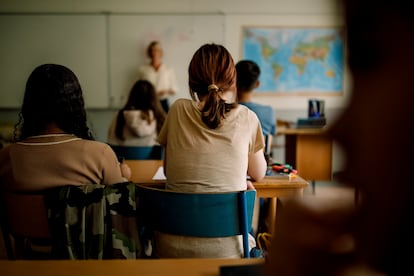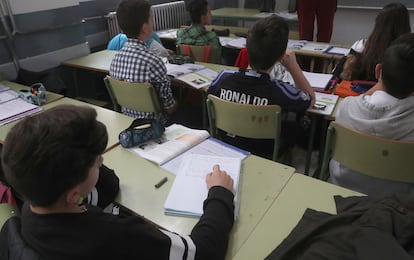How teachers and families can educate future adults who respect the environment
Subjects including Mathematics, Geography and Language can help students to be more aware of the importance of sustainability. Parents also play an essential role

In a fifth grade classroom, students calculate the carbon footprint produced by a car trip. It is a way of figuring out the effects that the vehicle has on the environment and their health. Next, they analyze what the emissions would be if this journey were made via a more sustainable means of transportation and one that emits less CO₂.
Teachers and families are important figures in young people’s education about the environment. Óscar Jerez, from the Geography Education Group at the University of Castilla-La Mancha in Spain, explains parents, together with educational figures, should encourage good habits from a young age: “It is important for fathers and mothers to be aware of the importance of protecting and conserving the environment.” Children learn best by imitation. “If the parents act sustainably on a daily basis, this learning can be developed through a cognitive process that occurs by observing and reproducing their parents’ behaviors in the environment,” he explains.
Both children and parents should be aware of the need to recycle, turn off the light or turn down the heating in their immediate environment. “Children ask questions like: ‘What planet am I going to inherit?’, ‘What will the world I’m going to live in be like?’, ‘Why do we care so little about the earth?,” says Fernando Guzmán, of the Department of Language and Literature Education at the University of Seville. Those questions, he says, could change families’ habits: “For this reason, I propose that we listen to children in a different way and pay attention to what they have to tell us about the future. They are the real agents of change, and their parents should join this new push that emphasizes co-responsibility for caring for the earth, their neighborhood, or their school.”
Sometimes dealing with the reality of climate change in the classroom can generate a feeling of deep despair in students. “When you raise these issues, for example, in elementary school, you have to be aware that you cannot transmit that responsibility to children, since they are not responsible for climate change,” says Ignacio Ramis from the Education Department of the University of Cuenca. “You have to inform them of the problem that exists so that they can live with it without falling into despair,” he adds. Sometimes, despite the efforts of teachers, it is very difficult for the lessons in the classroom to result in significant change at home. “For example, when they accompany their parents to the supermarket, they take home a lot of plastic, even if they don’t want to. For this reason, what you can do at school is one thing and the responsibility that you put on a person who does not have the capacity to make a big change is another,” adds Ramis.
Even so, students can learn how to be more respectful of the planet through different school subjects. For example, explains this expert, Mathematics is a fundamental calculation tool to understand with numbers how wasting food, wasting energy, felling trees or wasting water affect ecosystems and the populations that inhabit them. “If you are able to transform your class and talk about what an ecosystem is and make calculations about the impact you have on it through your consumption, you work on mathematics while your students become more aware of the problem.”
Geography classes can also include environmental knowledge that students can later share with their parents. “This discipline contributes to the development of values based on studies of the abuse of energy resources on a local and global scale,” says Ramis. In the case of issues related to energy, Geography, which integrates natural and social sciences, works together with other areas, approaching them from a geographical, spatial or territorial perspective, but also linguistic, mathematical, ethical, physical and philosophical.

On the other hand, the subject of Language, which may seem far from issues of environmental sustainability, can raise relevant reflections on the meaning of words. “Becoming aware of the social and ideological value of terms such as ‘sustainability’ or ‘waste’ is usually very effective,” says Guzmán. Everyday words have numerous stories that can be rediscovered and shared in the classroom. “Reflecting on the words that make up our discourse puts us in front of a mirror about how we take care of our common home, the Earth. Reflecting on language is also a way of taking an ethical stance,” he argues.
Likewise, Guzmán argues that every crisis generates new ways of communication: “This circumstance makes transition from the street to the school, and vice versa, more fluid.” Although he acknowledges that talking about the energy crisis can be tedious, if minors have the keys to this discourse, they can take a more active role in caring for the environment.
Sign up for our weekly newsletter to get more English-language news coverage from EL PAÍS USA Edition
Tu suscripción se está usando en otro dispositivo
¿Quieres añadir otro usuario a tu suscripción?
Si continúas leyendo en este dispositivo, no se podrá leer en el otro.
FlechaTu suscripción se está usando en otro dispositivo y solo puedes acceder a EL PAÍS desde un dispositivo a la vez.
Si quieres compartir tu cuenta, cambia tu suscripción a la modalidad Premium, así podrás añadir otro usuario. Cada uno accederá con su propia cuenta de email, lo que os permitirá personalizar vuestra experiencia en EL PAÍS.
¿Tienes una suscripción de empresa? Accede aquí para contratar más cuentas.
En el caso de no saber quién está usando tu cuenta, te recomendamos cambiar tu contraseña aquí.
Si decides continuar compartiendo tu cuenta, este mensaje se mostrará en tu dispositivo y en el de la otra persona que está usando tu cuenta de forma indefinida, afectando a tu experiencia de lectura. Puedes consultar aquí los términos y condiciones de la suscripción digital.








































